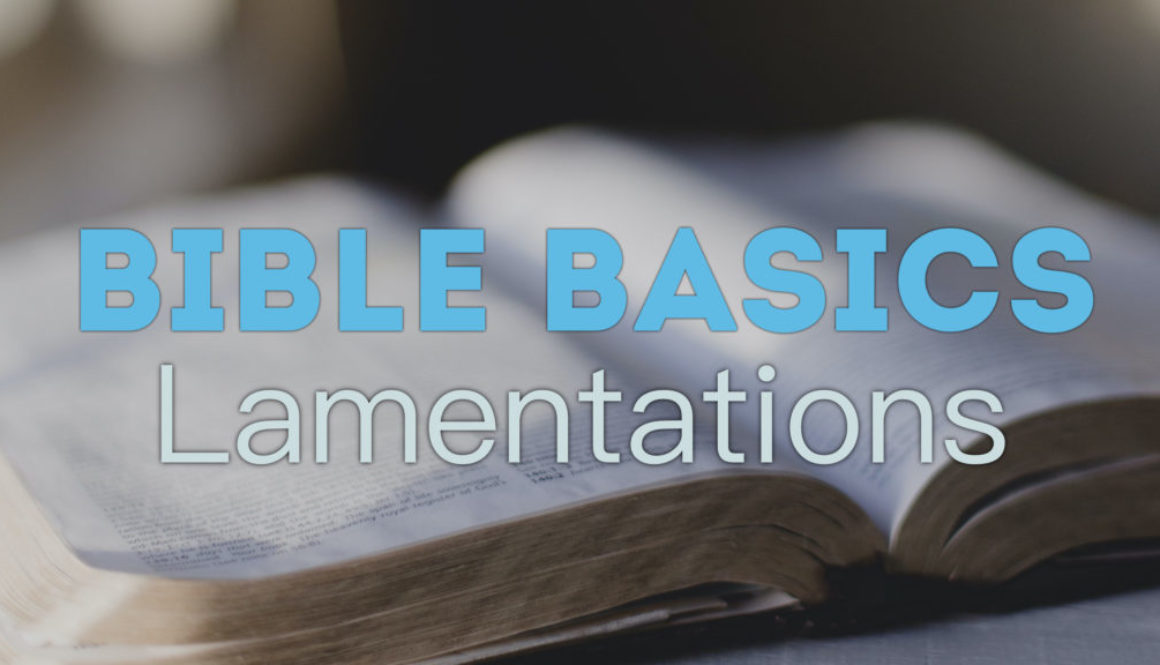Lamentations
Author
Unknown, although both Jewish and Christian tradition attribute the book to Jeremiah, especially based on 2 Chronicles 35:25. Some scholars contest this belief as the style of writing does not match that of the book of Jeremiah.
Date
The book was likely written very soon after the fall of Jerusalem to Babylon in 586 B.C. It was definitely composed before the Jews returned from exile in 516 B.C.
Audience and Purpose
As the author is unknown, the audience is not clear. If Jeremiah wrote the book, he would have been writing to the Jews who remained in Jerusalem after the destruction of the city, or to those who escaped to Egypt in Jeremiah 40-42.
If another anonymous author wrote the book, it is possible that it was written to the Jews who found themselves taken into captivity in Babylon, recounting the condition of the city left behind.
The book is a collection of five ‘elegies’ or poems of lament. The first four poems are written using an acrostic form, with chapters 1,2, and 4, beginning each line with each successive letter of the Hebrew alphabet. (Chapter 4 does this three times.) Although this form of poetry was originally designed to help in the memorization of the poems, some have speculated that Lamentations author’s intent was to show how complete the grief of the Jewish people was (i.e. ‘from aleph to taw,’ which is the Hebrew equivalent as ‘from A to Z’).
Major Themes
- Mourning and Grief.
- God’s Judgement for Sin.
- Justice and Mercy.
- Hope for Restoration.
Key Scriptures
- Lamentations 1:1 — “How lonely sits the city that was full of people! How like a widow has she become, she who was great among the nations! She who was a princess among the provinces has become a slave.”
- Lamentations 1:12 — “Is it nothing to you, all you who pass by? Look and see if there is any sorrow like my sorrow, which was brought upon me, which the Lord inflicted on the day of his fierce anger.”
- Lamentations 5:21-22 — “Restore us to yourself, O Lord, that we may be restored! Renew our days as of old— unless you have utterly rejected us, and you remain exceedingly angry with us.”
Outline
- Lamentations 1:1–22 — Poem 1: The Destruction of Jerusalem
- Lamentations 2:1–22 — Poem 2: God’s Judgement on Jerusalem
- Lamentations 3:1–66 — Poem 3: Hope in God’s Faithfulness
- Lamentations 4:1–22 — Poem 4: The Holy Stones Lie Scattered
- Lamentations 5:1–22 — Poem 5: A Prayer for God’s Restoration
Gospel Summary
As the author of Lamentations grieves the destruction of Jerusalem as a demonstration of God’s wrath over sin, our minds must immediately be drawn to the ultimate show of God’s wrath, poured out on Jesus on the cross. In fact, Lamentations 1:12 (see above) which describes the incomprehensible nature of God’s fury poured out has been used by many in reference to the suffering of Christ. The book closes with the hope of restoration, assuming God’s anger had been removed from the people. Once again, we are drawn to the understanding that until the atoning work of Christ on the cross, sinful humanity was still the target of God’s anger and judgement.
One interesting side note is that there is a place just outside the North wall of Jerusalem called, “Jeremiah’s Grotto,” which tradition says is the place where Jeremiah wept over the city and composed the book of Lamentations. This grotto sits near the bottom of a hill attested to be Golgotha, where Jesus would later lay down His life to bear the full wrath of God and enable the final restoration of not only Jerusalem, but the whole of creation.
If you’re enjoying the content I produce, a little caffeine to keep me going would be appreciated!
© Anthony Scott Ingram 2020. All Rights Reserved.
Photo by Carolyn V on Unsplash
Unless otherwise indicated, all Scripture quotations are from The Holy Bible, English Standard Version®, copyright © 2001 by Crossway Bibles, a publishing ministry of Good News Publishers. Used by permission. All rights reserved.”
Please note that I do get a small kickback from Amazon for any purchases made using the links on this post. Should you choose to purchase from them, I just want to say thank you for further supporting my work in ministry!
